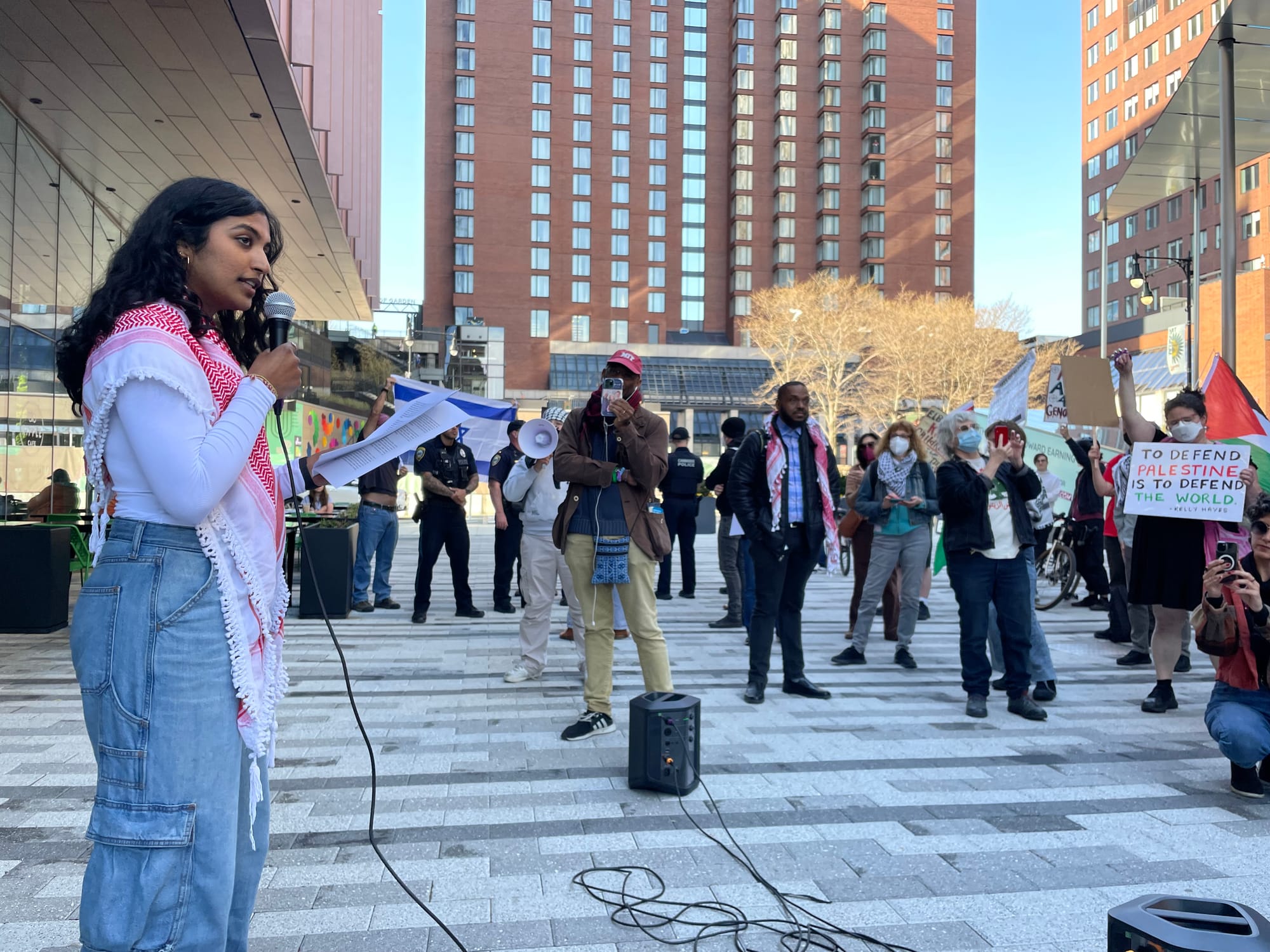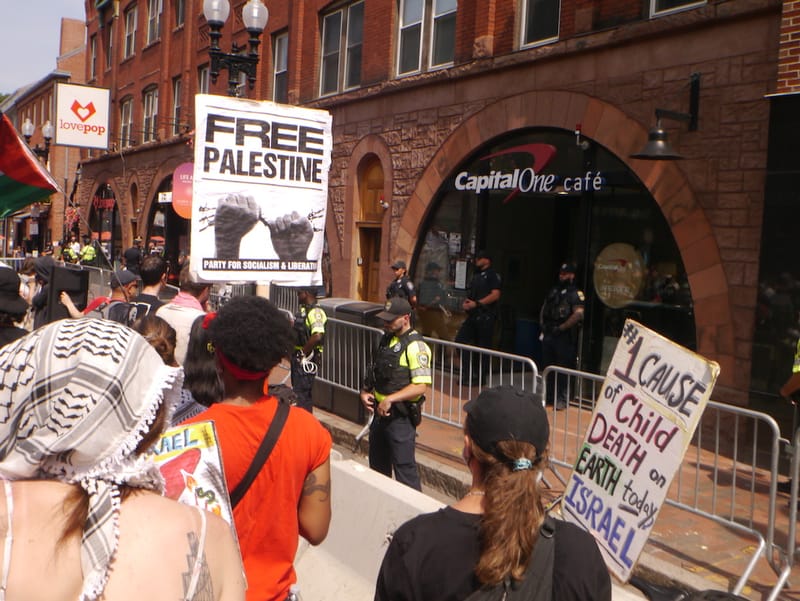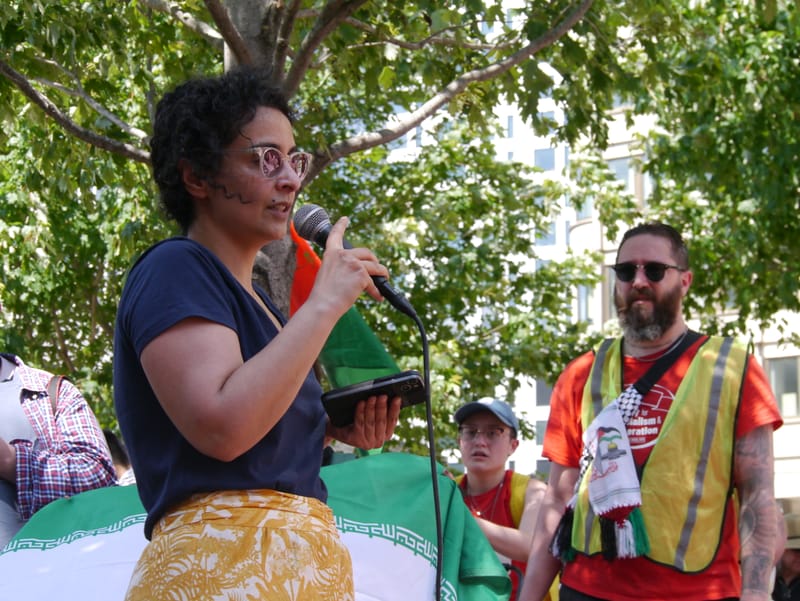MIT severs ties with Israeli weapons manufacturer

The Massachusetts Institute of Technology has severed its ties with Elbit Systems, the Israeli weapons manufacturer that has come under fire from peace activists as its munitions are bring used in Gaza and other conflict zones rife with human rights violations and civilian casualties.
Standing in front of the MIT Museum Thursday, several dozen demonstrators from MIT, the Boycott Divestment and Sanctions (BDS) Boston and other anti-war groups gathered to mark a victory in their push for institutional boycotts and divestment from arms manufacturers supplying weapons and military support to Israel during Israel’s siege of Gaza.
“Let this be a lesson to all the merchants of death: you have been put on notice,” said a speaker with BDS Boston. “You are a toxic asset, and the people are coming for you. We have shown that we have collective power. And we will use it.”
Until last week, Elbit was part of MIT’s Industrial Liaison Program, giving the firm access to the university’s faculty, research labs and emerging technologies. MIT Professor Michel DeGraff said the university’s involvement with Elbit violated its own policies against risk from “research outcomes [that] will be used in ways that would infringe on political, human, or civil rights in a foreign country.”
“There’s no doubt that collaboration with Elbit elevates these risks for MIT,” DeGraff said. “Elbit has been implicated in the killing of thousands of civilians, most of them women and children.”
The pressure campaign at MIT has come amid growing global backlash against Elbit. In 2009, the Government Pension Fund of Norway sold off its Elbit stock, based on the company’s manufacture of surveillance technology Israel deployed on its West Bank border wall, much of which Israel built within Palestinian territory in violation of international law.
Other European pension funds and banks in Denmark, Sweden, Britain and France, citing among other things Elbit Systems’ manufacture of weapons which are under international bans due to their history of causing civilian casualties. Elbit manufactures cluster munitions, for example, which are banned in the UK, Europe, Canada, Mexico and many countries in Africa and Asia. The munitions burst open above the ground, spreading anti-personnel bomblets that often fail to detonate, littering neighborhoods in Gaza and other places where they have been used with explosive cannisters loaded with shrapnel that often explode when stepped on or otherwise disturbed.
Over the last two years, as Israel laid siege to Gaza, killing more than 51,000 according to the Gaza Health Ministry, local activists protested weekly at the office an Elbit subsidiary the produces medical devices in Central Square. The Elbit subsidiary moved out in August of 2024, in response to the demonstrations.
The anti-war activists’ victory last week at MIT comes amid an unprecedented crackdown on anti-Israeli demonstrations across the country. Last year and in 2023, universities used heavy-handed tactics on protestors, including arrests, suspensions and expulsions. This year, the Trump administration has targeted foreign-born students who have protested against Israeli’s siege of Gaza with deportation.
While many students at last Thursday’s demonstration wore masks to obscure their identity, some said the intimidation and severe restrictions on protests at MIT haven’t softened their resolve.
“It hasn’t stopped us,” said student Megha Vemuri, who spoke during the demonstration. “It’s given us more fuel. It’s made us find other avenues to put pressure on the administration.”
Getting the administration to cut its ties to Elbit has also raised activists’ spirits, Vemuri added.
“It’s been revitalizing,” she said. “When you get a win like this, you understand every small thing you do makes a difference.”
DeGraff, a professor in the School of Humanities, Arts and Social Science, likened the MIT students’ victory to a proof of concept in the science world — a demonstration that universities can be persuaded to divest from companies complicit in human rights violations in Palestine.
“If MIT can do it with Elbit, others can do it with other entities,” he said. “This news gives me hope.”
Members of the Palestine Youth Movement have already set their sights on another target, the multinational shipping and logistics corporation Maersk, which is partnering with MIT on improving its operations through machine learning, AI, predictive analytics, new algorithms, and computational prototypes, according to a press release on its website. The firm has come under fire. In November, last year, Spain blocked entry to a Maersk container ship at the port of Algeciras over allegations it was carrying an arms shipment to Israel. Last week, port workers in Morocco called for a boycott of a Maersk ship at the port of Casablanca, with dock workers refusing to unload parts destined for Israeli F-35 fighter jets.
“Logistics companies function as an essential part of the weapons industry supply chain, and they have historically and remain today a key strategic element of any war effort,” said Lea Kayali, an organizer with the Palestinian Youth Movement. “By targeting one of the largest logistics companies transporting weapons components, we can interrupt the business of not just one, but all major weapons manufacturers.”






